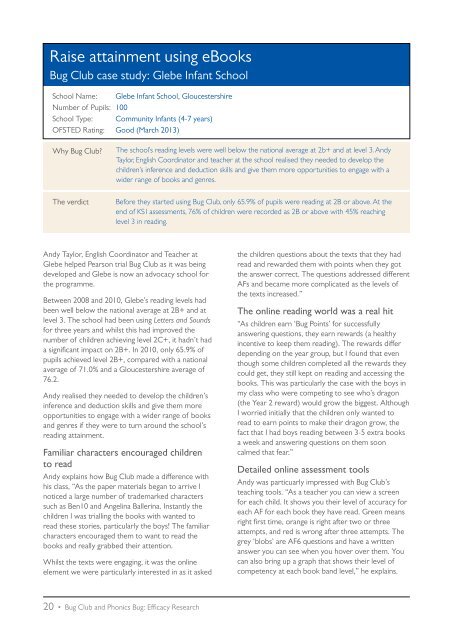Create successful ePaper yourself
Turn your PDF publications into a flip-book with our unique Google optimized e-Paper software.
Raise attainment using eBooks<br />
Bug Club case study: Glebe Infant School<br />
20<br />
School Name: Glebe Infant School, Gloucestershire<br />
Number of Pupils: 100<br />
School Type: Community Infants (4-7 years)<br />
OFSTED Rating: Good (March 2013)<br />
Why Bug Club?<br />
The school’s reading levels were well below the nati<strong>on</strong>al average at 2b+ and at level 3. Andy<br />
Taylor, English Coordinator and teacher at the school realised they needed to develop the<br />
children’s inference and deducti<strong>on</strong> skills and give them more opportunities to engage with a<br />
wider range of books and genres.<br />
The verdict Before they started using Bug Club, <strong>on</strong>ly 65.9% of pupils were reading at 2B or above. At the<br />
end of KS1 assessments, 76% of children were recorded as 2B or above with 45% reaching<br />
level 3 in reading.<br />
Andy Taylor, English Coordinator and Teacher at<br />
Glebe helped Pears<strong>on</strong> trial Bug Club as it was being<br />
developed and Glebe is now an advocacy school for<br />
the programme.<br />
Between 2008 and 2010, Glebe’s reading levels had<br />
been well below the nati<strong>on</strong>al average at 2B+ and at<br />
level 3. The school had been using Letters and Sounds<br />
for three years and whilst this had improved the<br />
number of children achieving level 2C+, it hadn’t had<br />
a significant <str<strong>on</strong>g>impact</str<strong>on</strong>g> <strong>on</strong> 2B+. In 2010, <strong>on</strong>ly 65.9% of<br />
pupils achieved level 2B+, compared with a nati<strong>on</strong>al<br />
average of 71.0% and a Gloucestershire average of<br />
76.2.<br />
Andy realised they needed to develop the children’s<br />
inference and deducti<strong>on</strong> skills and give them more<br />
opportunities to engage with a wider range of books<br />
and genres if they were to turn around the school’s<br />
reading attainment.<br />
Familiar characters encouraged children<br />
to read<br />
Andy explains how Bug Club made a difference with<br />
his class, “As the paper materials began to arrive I<br />
noticed a large number of trademarked characters<br />
such as Ben10 and Angelina Ballerina. Instantly the<br />
children I was trialling the books with wanted to<br />
read these stories, particularly the boys! The familiar<br />
characters encouraged them to want to read the<br />
books and really grabbed their attenti<strong>on</strong>.<br />
Whilst the texts were engaging, it was the <strong>on</strong>line<br />
element we were particularly interested in as it asked<br />
• Bug Club and Ph<strong>on</strong>ics Bug: Efficacy Research<br />
the children questi<strong>on</strong>s about the texts that they had<br />
read and rewarded them with points when they got<br />
the answer correct. The questi<strong>on</strong>s addressed different<br />
AFs and became more complicated as the levels of<br />
the texts increased.”<br />
The <strong>on</strong>line reading world was a real hit<br />
“As children earn ‘Bug Points’ for successfully<br />
answering questi<strong>on</strong>s, they earn rewards (a healthy<br />
incentive to keep them reading). The rewards differ<br />
depending <strong>on</strong> the year group, but I found that even<br />
though some children completed all the rewards they<br />
could get, they still kept <strong>on</strong> reading and accessing the<br />
books. This was particularly the case with the boys in<br />
my class who were competing to see who’s drag<strong>on</strong><br />
(the Year 2 reward) would grow the biggest. Although<br />
I worried initially that the children <strong>on</strong>ly wanted to<br />
read to earn points to make their drag<strong>on</strong> grow, the<br />
fact that I had boys reading between 3-5 extra books<br />
a week and answering questi<strong>on</strong>s <strong>on</strong> them so<strong>on</strong><br />
calmed that fear.”<br />
Detailed <strong>on</strong>line assessment tools<br />
Andy was particuarly impressed with Bug Club’s<br />
teaching tools. “As a teacher you can view a screen<br />
for each child. It shows you their level of accuracy for<br />
each AF for each book they have read. Green means<br />
right first time, orange is right after two or three<br />
attempts, and red is wr<strong>on</strong>g after three attempts. The<br />
grey ‘blobs’ are AF6 questi<strong>on</strong>s and have a written<br />
answer you can see when you hover over them. You<br />
can also bring up a graph that shows their level of<br />
competency at each book band level,” he explains.


